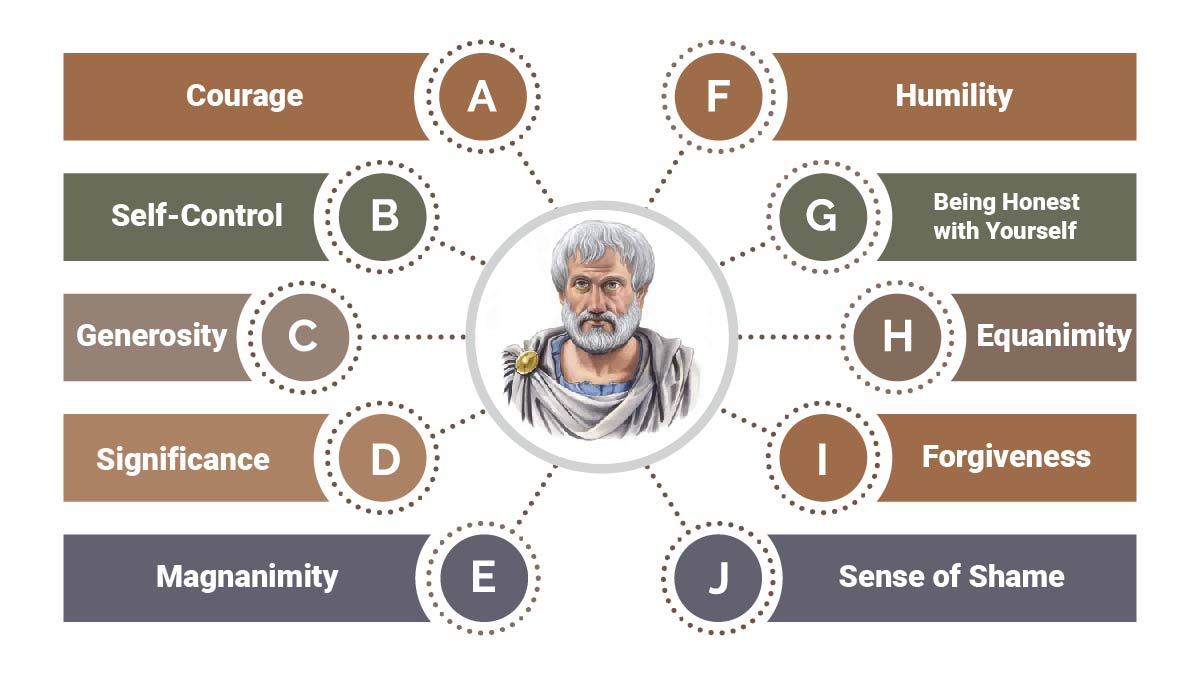According to Aristotle, virtue is the state of doing the right thing, at the right time, in the right way, and in the right amount, towards the right people. In Aristotle’s ethical theory, virtue is considered as a mean relative to individuals, determined by rational principles and the judgment of practical wisdom.
Virtues are character traits or psychological dispositions that enable individuals to act in ways that develop their potential and pursue their adopted ideals. Examples of virtues include honesty, courage, compassion, generosity, fairness, self-control, and prudence. Aristotle believes that the ultimate human good, or eudaimonia, is achieved through rational activity of the soul conforming to virtue, leading to happiness.
Socrates also views virtue as wisdom, grounded in certain knowledge and the ability to act effectively in specific situations.

Credit: www.iienstitu.com
Understanding Virtue According To Aristotle
Virtue, according to Aristotle, is a state concerned with choice, lying in a mean relative to us and determined by a rational principle. It is a characteristic that enables us to act in ways that develop our potential and pursue our ideals.
Virtue As A Mean
According to Aristotle, virtue can be understood as a mean between extremes. Aristotle believed that every virtue exists on a spectrum between two vices. For example, courage is a virtue, and cowardice and recklessness are its vices. Courage lies between these two extremes, finding the right balance between fear and rashness.
Aristotle argued that the mean is not simply an average, but rather a point of balance that is specific to each individual and situation. The mean is determined by reason and is not fixed or absolute. It requires careful judgment and consideration of the circumstances at hand. Aristotle believed that finding the mean in various areas of life is essential for cultivating virtue and leading a virtuous life.
Virtue As Relative To Us
Aristotle also emphasized that virtue is relative to each individual. Virtue is not an objective standard that applies to everyone in the same way. Instead, Aristotle believed that virtue depends on the individual’s unique characteristics, circumstances, and abilities.
For example, what may be considered courageous for one person may be reckless for another. The pursuit of virtue requires self-awareness and an understanding of one’s strengths and weaknesses. Virtue is not a one-size-fits-all concept, but rather a personal journey of self-discovery and growth.
The Role Of Rational Principle In Determining Virtue
Aristotle argued that the role of rational principle is crucial in determining virtue. Virtue is not simply a matter of following one’s feelings or desires; it requires the guidance of reason. Aristotle believed that rationality and practical wisdom are essential in making virtuous choices.
According to Aristotle, rational principle allows individuals to determine the mean and make virtuous decisions. It is through the exercise of reason that individuals can navigate between extremes and find the path of virtue. Rational principle guides individuals in determining what actions are virtuous and what actions are not.
In conclusion, Aristotle’s understanding of virtue involves finding a mean between extremes, recognizing the relativity of virtue to each individual, and relying on rational principle to make virtuous choices. Virtue is not a fixed ideal, but rather a dynamic concept that requires self-reflection, judgment, and the pursuit of practical wisdom.

Credit: medium.com
Examples Of Virtues In Aristotle’s Ethics
According to Aristotle, virtues are essential qualities that allow individuals to lead a morally upright and fulfilling life. Aristotle believed that virtues are cultivated through habit and are achieved by finding the mean between extreme behavior. In his famous work, Nicomachean Ethics, he outlines several key virtues that are crucial for personal and societal well-being. Let’s explore some of these virtues:
Courage
Courage is often associated with bravery and fearlessness, but Aristotle understood it as the ability to face and overcome difficulties and challenges. He believed that courage falls between the extremes of recklessness and cowardice. A courageous person knows when to act and when to exercise caution, demonstrating strength in the face of adversity.
Justice
Justice is the virtue that involves treating others fairly and giving them their due. According to Aristotle, justice is the mean between unfairness and excessive fairness. A just person acts with respect for the rights and welfare of others, promoting fairness and equality in all interactions and decisions.
Temperance
Temperance is the virtue of moderation and self-control. Aristotle believed that temperance is the mean between excess and deficiency. A temperate person avoids overindulgence and restraint, maintaining a balanced and harmonious approach in all aspects of life. This virtue leads to a well-disciplined and well-regulated life.
Patience
Patience is the virtue of enduring difficult situations without complaint or frustration. Aristotle considered patience as the mean between anger and apathy. A patient person demonstrates calmness and perseverance in the face of challenges, understanding that good things take time and that patience often leads to better outcomes.
Generosity
Generosity is the virtue of giving and sharing without expecting anything in return. Aristotle saw generosity as the mean between extravagance and stinginess. A generous person acts selflessly, helping others and contributing to the welfare of society. They understand the importance of giving back and find joy in the act of giving.
Honesty
Honesty is the virtue of truthfulness and integrity. According to Aristotle, honesty is the mean between deceitfulness and blunt honesty. An honest person speaks the truth with tact and sincerity, upholding moral principles and valuing transparency and trust in all aspects of life. Honesty builds strong relationships and fosters a sense of trust and authenticity.

Credit: theincap.com
Frequently Asked Questions On What Is Virtue According To Aristotle
What Does Aristotle Mean When He Says That Virtue Is Relative To Us?
Aristotle means that virtue is a state concerned with choice, lying in a mean relative to us and determined by rationality. It is a character trait that enables us to act in ways that develop our potential. Virtues like honesty, courage, and generosity are examples.
What Is Virtue In Virtue Ethics?
Virtue in virtue ethics refers to attitudes, dispositions, or character traits that enable us to act in ways that develop our potential. Examples of virtues include honesty, courage, compassion, generosity, integrity, fairness, self-control, and prudence.
What Is The Human Good According To Aristotle?
According to Aristotle, the human good is eudaimonia, or “happiness. ” It is achieved through rational activity of the soul in conformity with virtue.
What Is Virtue According To Socrates?
According to Socrates, virtue is the wisdom or knowledge to act effectively and correctly in a given situation, based on certain knowledge.
Conclusion
Aristotle’s ethical theory emphasizes that virtue is not simply an abstract concept, but a state of being that manifests in our choices and actions. It is a mean between extremes, determined by reason and the pursuit of the ideal. Virtues such as honesty, courage, and generosity enable us to develop our potential and live a virtuous life.
By understanding Aristotle’s perspective on virtue, we can strive to cultivate these qualities in ourselves and contribute to a more ethical society.

